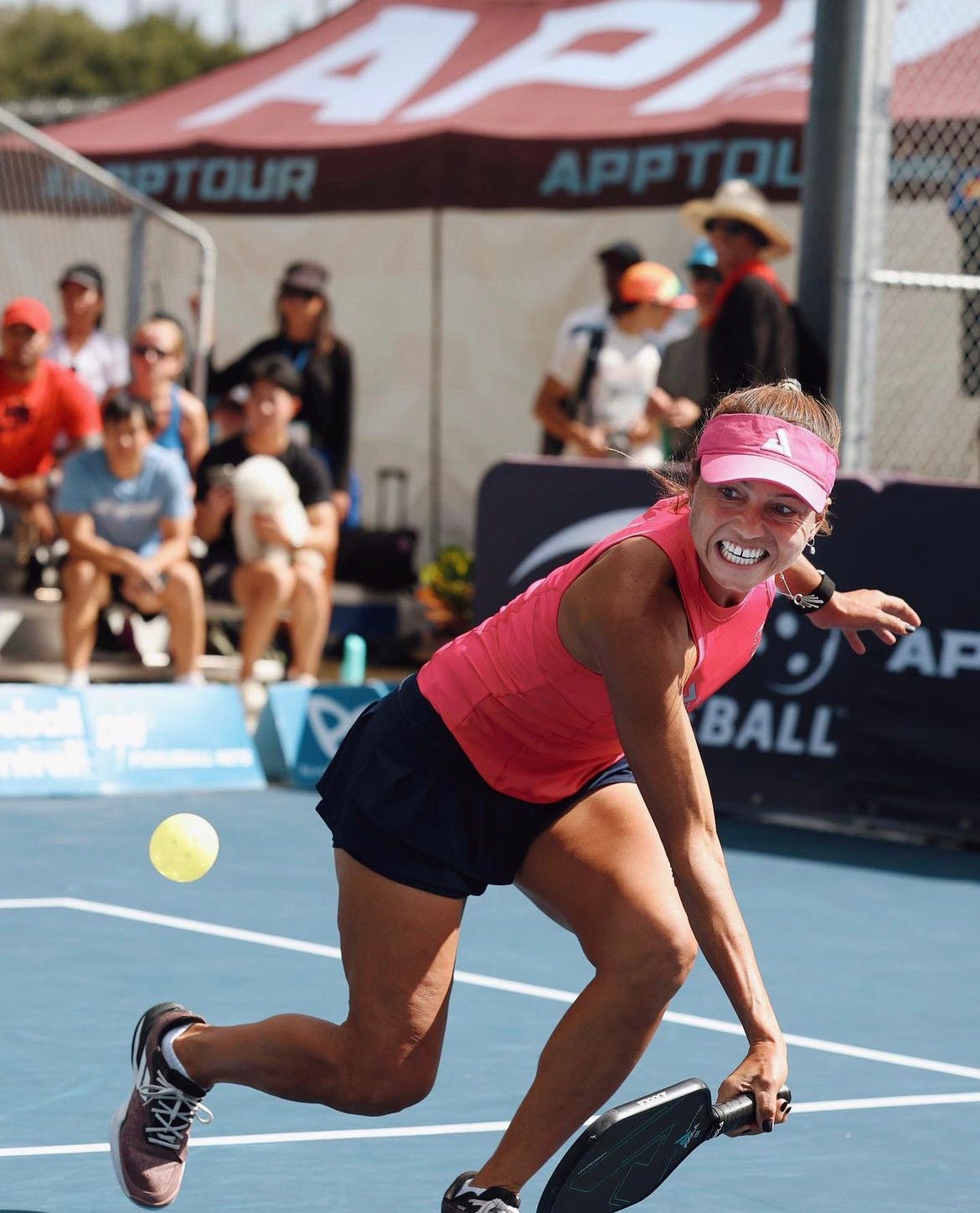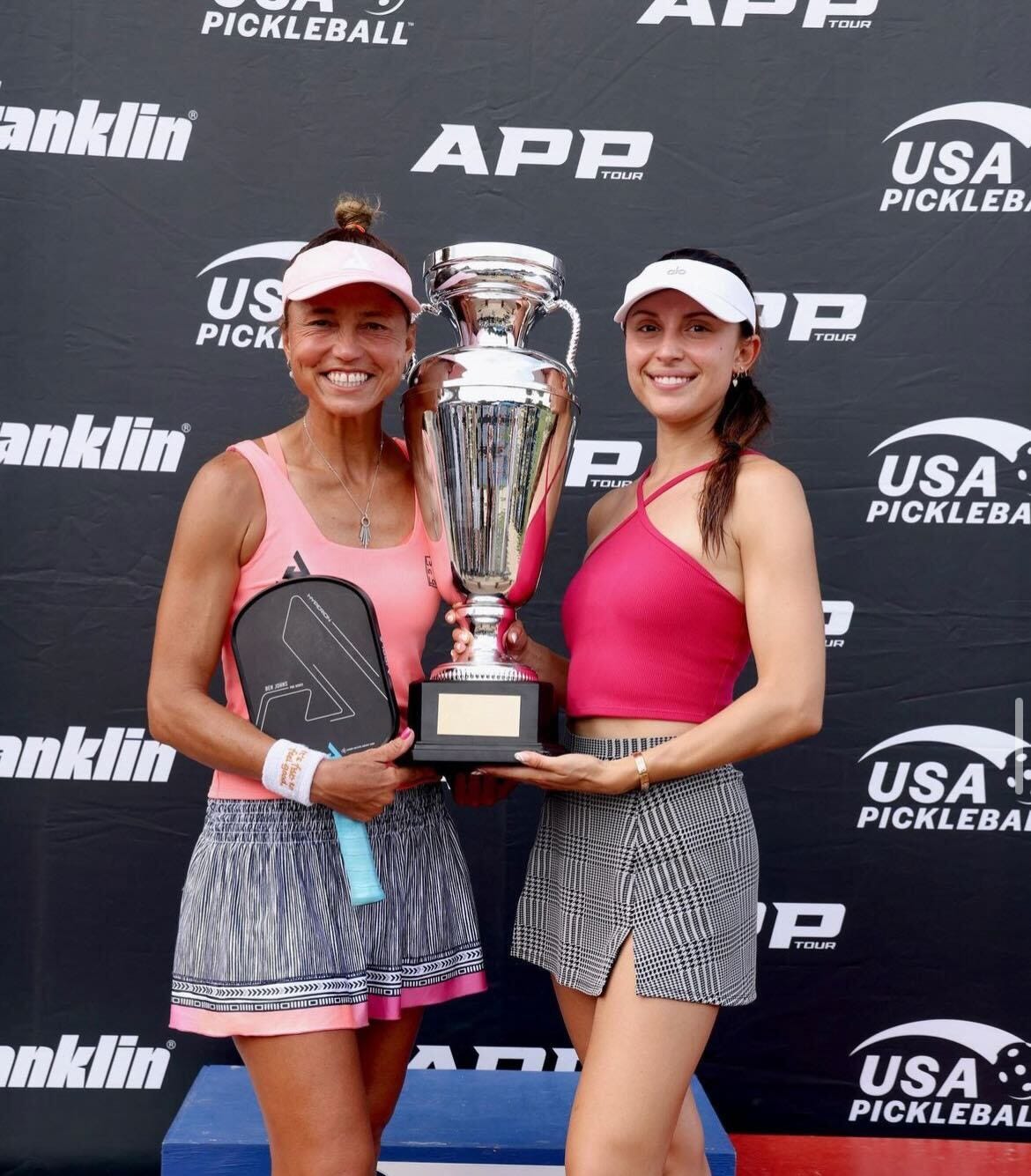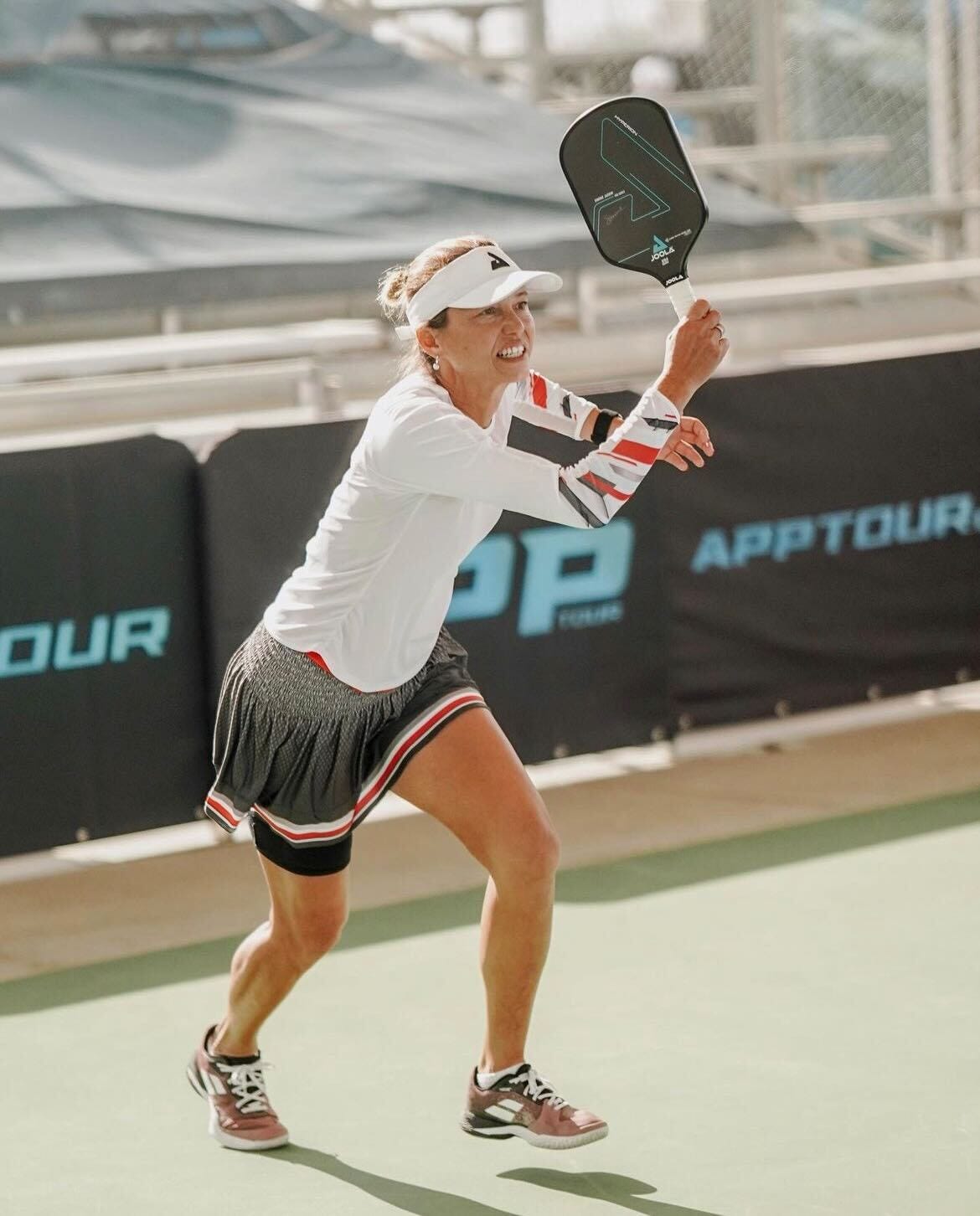Meet Simone Jardim, the ‘Serena Williams of Pickleball’
“Defeat is unacceptable. Although inevitable, it is unacceptable.”
A note from Polina: I’m excited to share this interview with Simone Jardim, an athlete often regarded as one of the best pickleball players of all time. She was interviewed by Simran Bhatia, a writer who’s been working with me for the last few months. I hope you enjoy it.
Simone Jardim is often referred to as “the Serena Williams of pickleball.”
Jardim is a former No. 1 player in collegiate tennis doubles, retired tennis coach, mom, owner of a premier pickleball academy, and record holder of 32 Pro Pickleball Association titles. Oh, and Jardim was ranked No. 1 in the world in pickleball – four years in a row.
In 2016, Simone Jardim (pronounced sim-oh-nee zhar-zhing) quit her cushy tennis coaching career to pivot into a brand new sport and figured out how to become the best. Pickleballers around the globe admire Jardim’s fitness, technique, and desire to win. If there’s one thing she hates more than anything, it’s losing.
According to USA Pickleball, the sport was invented in 1965 by three bored dads in Washington state. Pickleball is played on a badminton-size court with smaller tennis nets. It can be played in singles or doubles, and it requires only paddles and a plastic ball. Pickleball has exploded in popularity in recent years – partly due to quarantiners seeking fun outdoor social activities, but mostly because it sheds all the snootiness of tennis. People of all ages can enjoy pickleball. It’s one of the major reasons why Jardim fell in love with the sport.
Born and raised in Brazil, Jardim quickly climbed the juniors’ tennis scene of her country and began chasing professional tennis dreams in America. She now coaches others through her pickleball camps while continuing her pro pickleball career.
In the most comprehensive interview Jardim has ever done, she gives The Profile an inside look into her transition from tennis to pickleball, her winning mindset, and her fight to stay on top. (She also answers the million-dollar question: Will pickleball become an Olympic sport?)
This Q&A has been lightly edited for length and clarity.
You were raised in a racquet sport family – your two older brothers played racquet sports. Did you grow up practicing together, or was it pretty competitive?
JARDIM: Yes and no. Not when I was younger, because my brothers were a lot better. I actually started playing tennis because they both played tennis. It was an easy thing for me to do. My older brother ended up moving to Spain to play padel, [a racquet sport often described as a mix between tennis and squash]. He's actually representing Brazil in the World Cup. When he shifted into that sport, I was still in America playing college tennis, and that's when I got closer to him. More so because of the fact that he wasn't playing tennis anymore. But they were both very good tennis players, so I didn’t stand much of a chance.
When did it click for you that tennis was something you were good at and could potentially pursue professionally?
I started competing at national tournaments at a young age. I was top three in Brazil for pretty much every age group since I was 12. By the age of 16, I came to America to play some big tournaments, like the Orange Bowl. It’s a World Cup-kind of tournament with many countries, so I got noticed by colleges and I got a few emails.
But at the time, I wanted to pursue professional tennis. That's where my mindset was, so I didn't pay attention to the college interest. I just went and played a bunch of tournaments to see if professional tennis was going to be my path.
To be honest, it was terrible. I also am very impatient. I was just a number. I was just one more kid out there trying to make it. I didn't speak any English. That was scary as well. But then I was like, “Hey, you know what, I think I'm pretty brave. I can do this.” So I came to America because I needed to pass the TOEFL and the SATs. I got to live with an American family and went to a school for second language which helped me learn English. I took the TOEFL and passed it, which then gave me the opportunity to figure out where I wanted to go. At the time, a bunch of my friends from Brazil were all committed to Auburn University. Five of us ended up at the same school. I really liked it. I love college tennis.
But I was too competitive. And the team was just okay, we weren't great. I wanted to go play somewhere I could win, so my junior year I ended up at Fresno State. Amazingly enough, my doubles partner and I were No. 1 in the country. I'm pretty sure we were always in the top 20 in the country. And that's what I wanted to be. I ended up staying there and coaching for a few years.
How large of a factor is your environment in achieving success?
It’s all mindset.
For the majority of my friends, tennis wasn't a priority. But I wanted to be successful on the tennis courts. I came to America to do something. That was my goal from the get-go – to do well and continue to play, and maybe have a second chance at playing professionally after college. I wanted to be in an environment where I felt like people still wanted to improve and tennis was a big deal to them. I got really lucky because the guy that became the coach at Fresno State is one of the best coaches I’ve ever had.
You now have a successful pickleball coaching academy, after many years of being a collegiate tennis coach. You've made a career out of teaching others. What traits do you think make a great coach?
I really think it's about caring. I've always felt this way – whatever I'm doing, I want to be passionate about it, I want to really be in it.
Going into pickleball, I knew I needed to study, I needed to learn. I started teaching pickleball within the second year that I was playing. I saw there was a huge need for coaching. And like most people’s pickleball stories, I fell in love.
This sport is ridiculous. You get so addicted to it. And it's one of the easiest sports to pick up. It's also one of the hardest sports to master.
How did you know leaving tennis for pickleball was the right decision?
I quit my job as a Division 1 college tennis coach – the job was no stress, guaranteed money – for the unknown.
But it was time for me because I was burned out from coaching. I wasn't enjoying it anymore. It was time for a change. After eight years in Michigan, I needed to go somewhere warm. I went to Naples for a tennis conference, that's how I actually fell in love with the place first. The first US Pickleball Open happened that year.
When I saw what pickleball was becoming, I went back to Michigan, quit my job, sold our house, packed our bags, and we moved to Naples without a job.
What were your observations about pickleball that made you think “this is going to be the next big thing”? And why do you think pickleball has exploded in popularity in the past year?
My husband and I used to go to a Wednesday night pickleball group in Michigan. There were people from all different backgrounds, genders, ethnicities, and walks of life.
You don't find that in many sports. It was easy to be together, play, and have fun.
This is the only sport where you can find the grandma, mom, and kid playing together. The smaller court makes it much easier for somebody older to move. And then at the pro level, it's a completely different animal.
It's a very entertaining sport to watch in person. At the US Open, there were 1,500 people playing the tournament and a bunch of people watching so I definitely saw that this is going to become something. I figured we can make a comfortable living out of this and we will be living in a place that is amazing, raising our kids in a safe and warm place.
What makes pickleball better than tennis for you?
I have lingering injuries from so many years on the tennis court. Pickleball is easier on the body. In tennis, the other person is so far away from you. When you're hitting with somebody in pickleball, you're only a few feet from them, so it’s much more social. It's not a quiet sport like tennis — everybody's pretty loud. You will not find pickleball courts quiet. I've been way more successful on the pickleball court than I ever was on the tennis court.
How do you think your discipline for tennis helped you when pursuing a professional pickleball career?
When I started playing, my partner Corrinne and I used to do drills. I don't think anybody drilled pickleball at the time. I think most people just played. I was coming from tennis, and Corrinne played some tennis and golf. We knew that this was something that we wanted to get better at quickly, and we knew that drills would work. And it did.
If you think of the most successful athletes you've played against or coached across both sports, what common traits do they share? And what do you think makes an athlete successful beyond just their talent?
They hate losing more than they like winning. Defeat is unacceptable. Although inevitable, it is unacceptable. When you step on the court, your mentality is that no matter who you play against, you believe that you can win. It's something unique. Not everybody has that mentality because a lot of people don't believe that they can beat somebody potentially more talented than them.
Often, people focus so much on others than themselves. I think for somebody to be great at something, you have to look within. I've always tried to not compare myself to anybody. If I lose, there's something better that I can do.
It’s about coming back home, training, doing something different, learning something new, and not being afraid to put myself out there and try again. The will to win goes hand in hand with that. Never believing that you're done or that you're defeated.
Have you had moments during coaching where you were taken aback by something you learned from a student?
Absolutely. All the time. I feel like I'm always learning, I'm always getting better at teaching. I think everybody learns differently. You can’t be linear, you can’t just think of teaching in one particular way.
Certain students are more visual, so they need those visual cues. Some students need to feel it, so you need to have them feel their body throughout a stroke. I think that is something I'm always learning from each student I come across. When I'm teaching something, I can describe it a certain way, or I can show it a certain way.
All of a sudden, a student will say, “Oh, just like how I did this in another sport.” It’s a learning experience because next time I have somebody with that sport background, I can give that analogy. I think those teaching moments are priceless. I'm learning every day.
Do you think pickleball is on track to become an Olympic sport?
That would be amazing. It may not happen in my lifetime, but I'm hoping it will for the young ones to come. I believe that it's such an honor to be able to represent your country.
First, pickleball would have to grow more worldwide. The growth in America is crazy. It's ridiculous. But the growth in other countries is not at that point yet. Will it get there? We sure hope so. But it's just hard to know. The biggest issue is that the courts are mostly clay, and it's hard to play pickleball on clay courts. That would be an obstacle, but it doesn't stop people from building courts in gyms. I know people that are putting courts in their homes in Brazil. For the numbers to increase, you would have to talk about courts in many numbers, not just one or two, here and there.
If we just look at the next five years of pickleball, where do you see it growing the most? Do you think it could become a collegiate sport?
Definitely college. It's already an intramural in a lot of schools. It would be such an easy intercollegiate sport to follow. I think the following would be huge, because a lot of the faculty and students would be involved. It would draw huge crowds and would be such a great atmosphere for college.
If there is an opportunity to play in college, then more kids would play because of the chance of getting a scholarship. They go together in a way, because most kids enter sports because they like to play, but a lot of them stick with it because of the chance of playing in college.
I do believe that the numbers will keep increasing with parents, between 30 to 60-year-olds, because it's such a fun, good workout. Many places are being built where you can go, play pickleball, and then enjoy a drink. I think that’s the trend – something you can play with the family and then enjoy some social time.
For people trying out pickleball for the first time, what would be your advice to someone who wants to pick up a paddle and try? How do they get engaged with the community?
The biggest thing is the right equipment. Tennis shoes are most recommended. People try to play with running shoes and they end up getting hurt. Even though the court is small, I always recommend that you do a good warm up. Go out as if you were going to play a sport because it is a sport.
Think of pickleball as mini-tennis. It’s such a misconception that you don't have to move because you absolutely do. Wear proper attire, make sure that you are warmed up and ready to go. And don't be shy.
Most pickleball communities are super open to new people and welcoming. Don't be shy, walk in, go play, and have fun. You'll be amazed and surprised how easy it is to make new friends.
How do you take care of yourself, between a full schedule of both coaching and playing? What's the routine you keep to maintain a fit lifestyle and continue to be great at the sport that you play?
Well, honestly I never stop. I have two kids. I work and take care of a house. I do physical therapy once a week because of injuries that don't go away. The more you age, the worse it gets. But honestly, I never stop.
It's more about taking care of my body. I hate to lose but it’s going to happen the older I get. When I come back home I'm like, “Okay, I need to train more and more and more.” In reality, sometimes I have to rest a little bit more. Allowing my body to recover is important because I can’t just spring back like I could years ago. I train pretty hard. I try to be very efficient with my time. A lot of people lose track of time and they play for 3-4 hours. I don't have that kind of time. When I play, it's a solid two-hour practice and it gets pretty physical. It's very demanding and that's good enough for me. For the most part, I'm just playing and moving all the time.
You mentioned you like to be efficient with your workouts. How do you make your practices effective and efficient?
I still do practice plans. Some things don't change. Even though sometimes it's repetitive, it is what works and what I know best. Usually I know exactly what I need to work on, because when you lose, you come home and you have homework. I go in prepared. It's not a socializing time for me. This is training time, I have to use my time wisely. When I do these workouts and the training, I feel like I've accomplished a lot. I think most people like that feeling, rather than being at practice for a long time and not accomplishing much.
You're the most decorated female pickleball player, and you have dozens of medals and titles. What's next for you? And what goals do you have for yourself in this next phase of your career?
I really want to stay at the top. I know that I'm not where I was, and I'm coming to terms with it.
There was a pretty hard period of time where I had to accept that I'm not going to be what I once was. That’s a challenge for anybody psychologically. But I still want to win. I want to go into tournaments knowing that I can still compete and win. And if there comes a moment that I don't feel that anymore, that will be the time that I quit. I want to continue to enjoy it, and when I don't feel like I can win is when I pick up something else.
Who knows, I'll probably be playing darts or something. I want to step on the court feeling like I can win and I can beat anybody I play against. That is my number one priority – the moment I step on the court, I feel like I can win.
What has been the process for you coming to terms with aging as a lifelong athlete?
I'm still dealing with it. There are days that are harder than others because there are aches and pains that don't go away. It’s pretty frustrating. I'm the kind of person that likes to control as much as I can. Things that are out of my control are the most frustrating. But it’s the same for any athlete, when they get to the point where they are not what they believe they should be, or they are not where they were. There's a lot of self doubt that you battle. Slowly I’m getting myself in a better place mentally and getting used to being in this position.
Honestly, I would say that is perhaps the most inspiring thing about your journey as a pickleball player. Those 30- to 60-year-olds who are picking up paddles for the first time look at you and they believe, “I could be like Simone if I train like her”.
Absolutely. That's why I love doing what I do. I have a lot of people that come up to me and tell me those things. It keeps me going because I know that I'm making a difference in somebody else's life. There's nothing more rewarding than that. I feel like I have a purpose and that I’m helping somebody be better and giving them goals. I think the moment we realize that we don't need to be better than someone else, but better than ourselves, is the day we win.
How do you define the word ‘success’?
I could tell you my definition of success from yesterday, today, and tomorrow. Those are all different because I've changed.
I think at the beginning success for me was all about winning and my performance was all that mattered. Now that I have aged, success for me is to perform better each time. Am I getting a little faster? Am I gaining some of my speed back? Because the results will come if those things happen. It's a proven method. That's my measurement of success at this moment in time.
Just the impact that sometimes I have on women who are moms gets me emotional. When moms come to me, they tell me, “ I'm so proud of you,” and “It's amazing that you are juggling all of these things and trying to be great at everything.”
It is not easy. My day is like any other woman with the addition of practicing pickleball at a pretty high level. But I believe that's where my success will continue to inspire others.







First I'd say great and very inspiring story of Simone.
Second, very good article by Simran Bhatia. Very good example of having an interesting article is because of great set of questions and honest answers. I will definitely share this article with my family members.
Stellar interview revealing some deep insights into a top-level athlete in Simone Jardim.